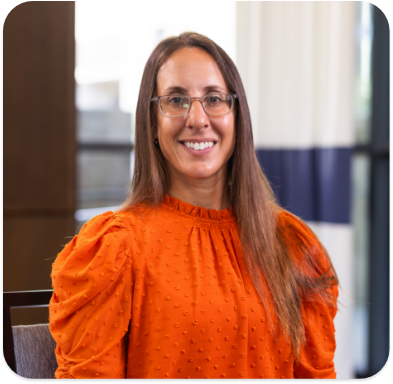Coach Them to Nutritional Success
Nutrition, a complex field, becomes more complicated when one considers the delicate relationships individuals can have with food and eating. They need someone who can explain these complexities in clear language, help them recognize the many factors that influence their relationships with food, and devise strategies and interventions suited for their specific circumstances.
You can learn to provide that guidance in our M.S. in Integrative and Functional Nutrition: Integrative Wellness Coaching Specialization program. This innovative program examines how nutrition relates to the biological, environmental, behavioral, and emotional factors that influence physical health and wellness and how you can best support clients while they address the issues caused by these internal and external influences.
Integrative wellness coaching pairs perfectly with integrative and functional nutrition because both fields believe that wellness is achievable when the inner self harmonizes with the outside world. As a nutrition expert equipped with coaching skills and competencies, you will be able to use evidence-based approaches to build the structured systems your clients need to discover the ideal balance that supports their well-being.
The M.S. in Integrative and Functional Nutrition: Integrative Wellness Coaching Specialization program is designed to fulfill the current academic requirements for the Certified Nutrition Specialist (CNS) credential from the American Nutrition Association. This degree program is also designed to meet the core academic requirements for the Certified Clinical Nutritionist (CCN) credential from the Clinical Nutrition Certification Board. The M.S. in Integrative and Functional Nutrition: Integrative Wellness Coaching (IWC) Specialization program does not lead to eligibility for the Registered Dietitian Nutritionist (RDN) credential.
By satisfying the required coursework, you are eligible to earn a Certificate in Integrative Wellness Coaching. Saybrook University's Integrative Wellness Coaching Certificate program is a Level 1 International Coach Federation (ICF) accredited coach education and training program (125 contact hours) and a National Board of Health and Wellness Coaching (NBHWC) Approved Training Program (88 instructional hours). Learn more about the Integrative Wellness Coaching Certificate program here.
M.S. in Integrative and Functional Nutrition: Integrative Wellness Coaching Specialization Job Outcomes
Many of our Integrative and Functional Nutrition graduates use their degrees to start private practices and nutrition centers or apply their newfound skills to enhance already established careers in consulting, research, higher education, and coaching.
M.S. in Integrative and Functional Nutrition: Integrative Wellness Coaching Specialization graduates have the interdisciplinary skills to excel in a variety of rewarding career fields, including:
- Clinical nutrition
- Functional medicine
- Community and public health
- Teaching and academia
- Personal coaching
- Sports nutrition
Other Integrative and Functional Nutrition Programs
Interested in another Integrative and Functional Nutrition program? We offer multiple options that may align more closely with your goals.
- M.S. in Integrative and Functional Nutrition
- M.S. to Ph.D. Pathway in Integrative and Functional Nutrition
- Ph.D. in Integrative and Functional Nutrition
*Credits earned depend on approved transfer credits and prerequisite courses.
Program Components
Admissions Requirements
The M.S. in Integrative and Functional Nutrition: Integrative Wellness Coaching Specialization program is specifically geared toward those who do not currently hold an International Coaching Federation (ICF) or National Board for Health and Wellness Coaching (NBHWC) credential.
Applicants for this program must submit the following:
- Official transcripts from an accredited university demonstrating successful completion of an undergraduate degree with a 3.0 GPA or better
- Official transcripts showing completion of undergraduate or graduate-level science courses in the past 10 years with a minimum grade of B in each, including three credit units from each of the following subjects: biochemistry or organic chemistry, anatomy and/or physiology, and human nutrition
- A personal statement of up to 500 words explaining your educational objectives in pursuing this degree
- Writing sample (may be required if personal statement contains grammatical mistakes, spelling errors, or poorly organized text)
- Current resume or CV
Invest in Your Future
Saybrook University remains committed to keeping higher education affordable and accessible. Our Financial Aid Department is ready to offer guidance and support in determining suitable financial assistance tailored to your needs, including potential scholarship opportunities, grants, and more.
Cost
Saybrook wants you to have the information you need to make an informed decision about your academic and career aspirations. Our cost calculator provides an estimated cost of attending Saybrook to earn your M.S. in Integrative and Functional Nutrition: Integrative Wellness Coaching Specialization program.
Sample Courses
Systems Biology
In Systems Biology, you will learn the physiology, pathophysiology, and applicable biochemistry that underlie the seven core imbalances within functional medicine. Understanding the physiological systems, and how they become unbalanced, is key to identifying and supporting
interventions that address chronic disease. You will explore how core imbalances within biological systems–cardiovascular function, immunity and inflammation, digestion, absorption, and elimination–contribute to chronic conditions like cardiovascular disease, autoimmunity, food allergy and intolerance, and gastrointestinal disorders.
Foundations of Integrative and Functional Nutrition
In this course, you will expand upon your knowledge of basic nutrition science and gain a foundational understanding of integrative and functional approaches to nutrition. This course reviews the fundamental principles and perspectives of conventional, traditional, integrative, and functional medical models to identify best practices for nutritional care.
Coaching Courses
Evidence-Based Coaching
This course presents a comprehensive overview of the foundational coaching competencies and skills as defined by the International Coach Federation (ICF) and the National Board of Health and Wellness Coaching (NBHWC). Throughout the duration of the course, students will:
- Learn about the similarities and differences between coaching, counseling, and consulting
- Apply the coaching framework and skills to facilitate effective coaching conversations and processes
- Review the theories and evidence-based approaches that support the coaching process and its outcomes
- Discuss career opportunities within the coaching profession
This is the first of three required courses in Saybrook’s Integrative Wellness Coaching Certificate program.
Credit(s):3.0
Prerequisite(s): None Offered:SP – Term A/B Course Length:15 weeks; two-day, 18-hour Virtual Learning Experience required
Intermediate Coaching
This intermediate-level coaching course is designed to strengthen the core coaching competencies taught in the foundational COA 5628 Evidence-Based Coaching course. Throughout the eight-week term, students will:
- Discuss and practice intermediate coaching skills and competencies
- Identify and use various health and wellness assessments related to coaching
- Identify opportunities and approaches to integrate mind-body-spirit techniques within coaching sessions
- Strengthen self-coaching skills and self-care practices
- Investigate coaching opportunities within the integrative health care field (e.g., medical, community health and wellness, private practice, corporate wellness)
This is the second of three required courses in the Integrative Wellness Coaching Certificate program. Credit(s):3.0 Prerequisite(s):COA5628
Offered: SU – Term A Course Length:8 weeks; two-day, six-hour Virtual Learning Experience (VLE) required
Advanced Coaching
In the final skills and competencies development course in the coaching curriculum, students will engage in twelve experiential coaching sessions with 3-4 practice clients.
This advanced coaching course provides students with the opportunity to utilize and improve their spectrum of integrative wellness coaching skills within their specific coaching niche. Students will receive weekly faculty supervision and peer coaching support via videoconference, mentoring, and online discussions.
This is the third of three required courses in the Integrative Wellness Coaching Certificate program.
Credit(s):3.0
Prerequisite(s): COA5628 and COA5628 Offered: FA – Term A/B (Offering depends upon enrollment numbers) Course Length:15 weeks; No VLE required
Catalog
Please refer to our academic catalog for more information on the M.S. in Integrative and Functional Nutrition: Integrative Wellness Coaching Specialization program.
University Learning Experience
Our M.S. in Integrative and Functional Nutrition program is a 100% online program. While the core of this program is completed asynchronously, there are required synchronous, online features designed to deepen your educational experience. We call this a Virtual Learning Experience (VLE). In addition to the VLE, you will begin your studies with a virtual Welcome Week. Welcome Week activities, including a program orientation, are held online during the week before the start of Fall and Spring semesters. The in-person Community Learning Experience (CLE) is also available for you to explore. The CLE is held every odd-numbered year. It is optional and not required to complete the program.

Integrative and Functional Nutrition Faculty
Saybrook’s Integrative and Functional Nutrition faculty are practitioner-scholars dedicated to advancing their field through continued practice and comprehensive instruction. Meet some of our faculty members below.

- Associate Professor, Integrative and Functional Nutrition
- Past President, Florida Public Health Association
- Past Co-President, Broward Academy of Nutrition and Dietetics
UNBOUND: Integrative and Functional Nutrition
Guided by an interdisciplinary, integrative approach, you will examine the field of nutrition through a systems-based, humanistic lens that incorporates the environmental, social, psychological, and physiological sciences.


Understanding LGBTQ+ Food Insecurity: A Guide for Nutritionists

Integrative and Functional Nutrition’s Role in Your Health
Ready to Take the Next Step?
Submit an inquiry and one of our admissions specialists will connect with you to answer your questions and guide you through next steps.
























